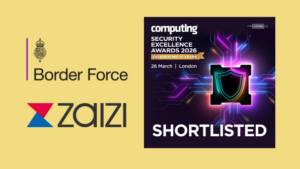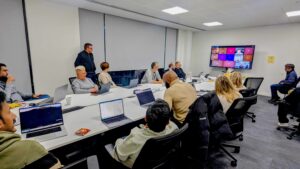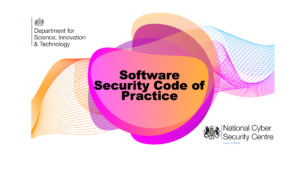
How CyberFirst interns shaped Zaizi’s AI training programme
Making an impact as an intern can be difficult. Too often internships are short stints, filled with routine tasks and little responsibility.
That wasn’t the case for two CyberFirst interns who joined Zaizi for seven weeks recently.
They played a key role in our new “AI-First vs AI-Assist” developer training programme, exploring how artificial intelligence can help prepare the next generation of public sector developers.
Their work allowed us to look at two AI integration approaches in software development: ‘AI-First’ tools that build apps from prompts and ‘AI-Assist’ tools that aid developers as they code.
In this blog, we speak to both interns about the project, their experience at Zaizi and their journey through the CyberFirst scheme.
White paper AI-First vs AI-Assist: Early-career developer training in the public sector
Tell us a bit about yourself and your experiences within the CyberFirst internship scheme?
Intern 1: “I’m going into my second year studying physics at university. Outside of my studies, I am passionate about sport and play in a band. It’s my first year on the scheme, and I have already been able to participate in CTFs, Hackathons, and attend talks from all branches of cybersecurity.
Intern 2: I learned about CyberFirst through word of mouth and decided to apply. It has been an excellent resource for knowledge, as well as for finding internships and graduate opportunities. The career fairs are incredibly valuable. It’s a highly beneficial programme for anyone interested in cyber security, whether they’re looking for post-graduation opportunities or a year in industry.
Why did you choose Zaizi for an internship?
Intern 1: “The first thing I noticed when researching Zaizi was how interesting the work is. From the first interview, I really got a sense of how welcoming, friendly and open the culture is here.
Intern 2: “I chose Zaizi for two main reasons. First, having worked at a smaller startup during my gap year, I knew that Zaizi would offer a great work-life balance and a family-like culture. Second, as a consultancy, it presented a very different experience than I’d had before.”
What have you been doing at Zaizi?
Intern 1: “During my first week, we were given a crash course in software development: agile, pair programming, testing, source control, secure by design, performing code reviews and how to make applications as accessible as possible. The overall aim of the internship was to see how well different AI tools performed and experiment with using AI to generate large amounts of code, versus using it to help us along, like a pair programmer. We did this through two different projects and then presented our findings and experience to the rest of the company.”
Intern 2: “We started with a week of helpful workshops covering topics from testing to Git to vulnerabilities. It provided us with a great understanding of the company and some basic skills that proved useful in the weeks that followed. We then immediately began two three-week-long projects, working in an agile style with stand-ups and retrospectives.”
How has the experience developed you?
Intern 1: “I have learnt loads here at Zaizi. I learnt about best source-control practices, the agile software development cycle, ensuring websites are secure, prompt engineering/how to get the most out of AI… the list goes on. One of the most valuable things I’ve developed is how to present my ideas and findings succinctly to a large group of people with varying technical knowledge.”
Intern 2: “I’ve improved my coding skills in JavaScript and HTML, but most importantly, I believe I’ve significantly enhanced my people skills. Learning to collaborate with others, both professionally and socially, has given me great confidence moving forward.”
What are your ambitions for the future?
Intern 1: “I want to go into something cyber-based but I’m not sure what yet. I intend to explore other professions — more around hardware and physical security. But after my experience here, I can see myself doing software development at Zaizi or a company that does similar work.”
Intern 2: “While I’ve always aimed to work in motorsport, this experience has been absolutely amazing. So I might explore further opportunities in cybersecurity or with Zaizi in the future.”
Why should students apply for a CyberFirst scheme?
Intern 1: ” If you are interested even slightly in cybersecurity, you should apply for it. You don’t even need technical skills like programming, just an interest and willingness to learn. It’s a great scheme that has allowed me to meet like-minded people, explore various careers, secure this internship, and attend amazing events like CTFs and talks from professionals working in cybersecurity. As well as the bursary money — which is nothing to be sniffed at!”
Intern 2: “CyberFirst provides access to exclusive opportunities that help students stand out in a highly competitive job market. The effort you put in is definitely worth it in the long run.”
How have you enjoyed the culture at Zaizi?
Intern 1: “I couldn’t have asked for a more welcoming, relaxed and understanding company culture. Everyone here was really friendly and took an interest in what we were working on — including our presentations after each project. Zaizi also does (almost) weekly socials, and it was really nice to meet and chat with other people in the company.
Intern 2: “I’ve thoroughly enjoyed the culture at Zaizi. It has provided me with so many new skills and friends who will stay with me for a lifetime. It’s a super relaxed environment that fosters a passion for creating, and the pool table is a huge bonus!”
Read our whitepaper to find out more about our AI-First vs AI-Assist experiment.
-

Border Force and Zaizi shortlisted for Computing Security Excellence Awards
-

How Zaizi’s AI sandbox hackathon with NayaOne proved we can build faster and safer
-

From guidance to action: raising the bar on software security across UK supply chains
-

Designing in secure spaces: How to be user-centred when user access is limited
-

Zaizi founder Aingaran Pillai named chair of techUK’s Security and Public Safety SME Forum
-

Zaizi ‘Highly Commended’ for Best Employer at 2025 Computing Women in Tech Excellence Awards
